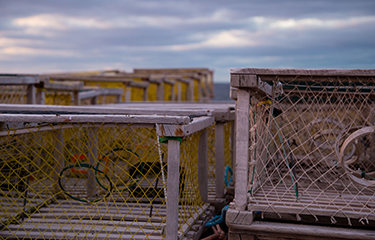The government of Canada has signed an agreement with Bear River and Annapolis Valley First Nations members to establish a lobster season, the culmination of over a year of tension between First Nation and commercial fishers.
The interim agreement will allow Bear River and Annapolis Valley First Nations members to fish lobster “in pursuit of a moderate livelihood during the established seasons in lobster fishing areas (LFAs) 33, 34, and 35,” the Department of Fisheries and Oceans (DFO) Canada said in a release. The agreement will allow up to 3,500 lobster traps – at 70 per harvester – to be established during a fall season in the LFAs.
“This understanding will see Bear River and Annapolis Valley First Nations fishing in pursuit of a moderate livelihood,” Minister of Fisheries, Oceans, and the Canadian Coast Guard Bernadette Jordan said. “It respects the vision and needs of each community, aligns with DFO’s regulatory framework, and will ensure a sustainable, stable fishery for all. This is a positive step forward, and one that we are proud to take in partnership.”
The interim agreement, which has not yet been signed, will not increase fishing effort in the LFAs - a source of past tension between commercial fishers and First Nation fishers. For that reason, it was partially welcomed by local commercial fishing organizations.
"The fact that the agreement focuses effort on fishing within season and without adding to the overall effort is critically important to keeping the fishery sustainable for Indigenous and non-Indigenous commercial fishers," Maritime Fishermen's Union Executive Director Martin Mallet said in a release.
However, commercial fishers objected to being excluded from talks regarding the agreement.
"It is completely unacceptable to exclude commercial fishing organizations from direct talks with DFO and Indigenous leaders on the management of the fishery, given the foreseeable impacts on the fishery management and access to fisheries for all Canadians of the changes implemented by DFO across the Atlantic,” Gulf Nova Scotia Fleet Planning Board President Gordon Beaton said. "Commercial fishing organizations must have a seat at the table on fishery management."
The disagreement between commercial fishers and members of a number of First Nations stems from indigenous fishers fishing outside of the standard federally regulated season, citing a Supreme Court decision from 20 years ago – known as the Marshall Decision – that allows the tribes of the Mi’kmaw community to fish in “pursuit of a moderate livelihood.” That decision is what resulted in tribes – such as the Mi’kmaq and Sipekne'katik –initiating a fall fishery for lobster.
In 2020, the situation shifted after the DFO couldn’t come to agreement with the tribes on the definition of “moderate livelihood." That disagreement led to tensions flaring between commercial fishers and First Nations fishers as some First Nation lobstermen sold part of their catch – something commercial fishers objected to.
According to Prince Edward Island Fishermen’s Association President Bobby Jenkins, that core disagreement is still an issue.
"Folding the moderate livelihood within season is a positive step, but the definition of what makes for a moderate livelihood for Indigenous Peoples is still undefined," Jenkins said. "We need clarity on what moderate livelihood means because of confusion where some say it is only for food, social, and ceremonial purposes, while others believe it is much more."
Jordan lost her reelection bid in her local riding in Nova Scotia – with her loss partially being blamed on her handling of the tension between First Nations and commercial interests.
The measure has apparently not alleviated tensions between the Canadian government and the Sipekne'katik, who were not a party to the recent agreement. APTN News Canada reported that tribe members claim the government has been seizing traps set under the tribe’s self-regulated fishery off southwest Nova Scotia.
Photo courtesy of Vicki Hossack/Shutterstock







